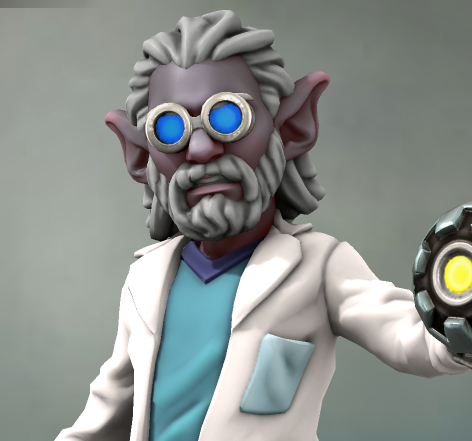Good day syres and sirras of the Holy Court, I come to you to ask only one question: How does a language die? I would answer with silence.
You're advisors may warn of a situation like in the distant Galaban Country, but as a Halfling myself I can emplore you our culture of peace and diplomacy rather than the rather brutish approach of the Western Dwarves. Well, even if we were Dwarves you're own royal policies over recent years have left my kinsmen too weak and starving to till the soil let alone wield the same tools against your enforcers.
Yes, I can predict your upcoming jeers from the smirks on your faces. Why would you listen to someone who doesn't even come from a native speaking family? What would I know, and surely I am prolonging the problem by not even speaking it myself? And I would simply retort with the fact there is no point. Habadian's death is as inevitable as the eventual fall of the Great Dance. I am simply asking. Nay, begging, the court of your holiness to at least preserve the knowledge kept secret by this language alone and will be lost forever.— Transcript of Professor Dannad Stonebridge's appeal to the court of King Faust of Analand and Jabaji
Introduction
Halflings are a race native to the
Shamutanti Hills region between the
Kingdom of Analand and the
Yoshan City-State. In their own tongue, however, halflings refer to themselves as the
Habad and their language is therefore known as
Habadian (or
Halfling Common).
History
Halflings as a race are relatively new compared to others that inhabit the Mortal Realm, with their origins heavily obscured and mythicised. The first instances of the race appeared in the Shamutanti Hills during the final year of Emperor Sarrus I von Apollyon's reign (r. 3E 86-124) over the Midlandian Empire, and quickly developed a language similar to the local Analander language.
As the Kingdom of Analand's language changed over the centuries as they started seeing more and more linguistical influences from
Imperial Common and turned into the dialect of
Analander Common it is now, Habadian did not feel the same level of influence. Instead, Habadian shared most similarity with the now ancient Analander with small amounts of influence from both Imperial Common and
Modern Yoshan. This longing for a unique and separate culture from the Habad heightened during the
Warlord Period, where the Kingdom of Analand and
Yoshan Trade Empire fought tooth-and-nail over the
Coronet of Jabaji and the rights it provided over the arable lands the Habad inhabited.
Decline (Late 3E - Early 4E)
With the
Treaty of Birritanti, the conflict between Analand and Yosha had ended and Analand declared its claim over the Shamutanti Hills and all those who inhabited them. This event is largely agreed as the catalyst for Habadian's decline in native speakers and when the gradual language death started.
Between the reigns of King Jules the Great during the Warlord Period and King Louen of 4E 211, around ten generations of halflings had born and died under the fealty of the King of Analand. During this time, Analander Common became the prestige language of the Shamutanti Hills and forced the local population of the Habad to become bilingual.
As time passed on, halflings in general were viewed more and more as a lesser class of subject in Analand with the Habad being even lesser due to them remaining in their ancestral lands rather than fully integrating into Analander culture. Though despite the Habad remaining in Shamutanti and continuing their traditional ways of life as best they could, to remain economically stable and to rise above being no better than serfs the prestige language became ever dominant. After so many generations, Habadian was spoken only in the privacy of homesteads with all official texts and public appearances being conducted in their liege's Analander Common.
Death (4E 293 - 297)
In recent decades, the Kingdom of Analand have abandoned the Shamutanti Hills. A Great Purge forced undesirables outside the Analander heartlands and the Great Wall of Analand was built on the Analand-Shamutanti border cutting the two regions indefinitely. The Habad settlements suffered the most from this, falling into destitution without any trade or support after their crops were raided by those fleeing the continuing Great Purge. However, in this time, the Habadian language felt a resurgance of sorts.
However, when
Faust Arkle rose to the throne in
4E 293, the
title over Jabaji was reclaimed by Analand. For the next years until the modern day of
4E 297, the Shamutanti Hills have been systematically purged of their land and culture as the land has been exploited with no care for those who work it. In this time, Habadian has since suffered a radical language death over the fear of backlash from the Habad leading to a fear from Analanders of halflings themselves especially those who did not integrate.
In 4E 297, no Habad teach their young their traditional language anymore, and do not speak it even in their own homes for fear of further persecution as more Analander Lawmen patrol the rural dirt tracks. Only the very oldest generation of the Habad who remember a time before the Great Purge still speak Habadian amongst themselves, exiled into the newly established town of Taddapani to keep those who failed to integrate together in one place. When they die, no native speakers will exist or anyone keeping it alive for any reasons.








I think you nailed it in terms of the problem set, i.e., "describing the death of a language". Sure, I would be thrilled to see/hear some words, find a new alphabet, etc. but the narrative gives a very clear view over what happened and why the Habadian is dying. That said, as the Stout Halflings adapt so well, maybe they will form a distinct version of Analander, as it happened some centuries ago.
Thank you! If inspiration ever hits I shall sate your desires to the best of my abilities good sir! But.. no promises just yet ;-)